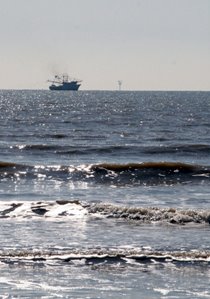Hurricanes Alter Gulf Landscape, Perhaps Forever
 Evidence of last years record breaking hurricane season can still be found as one gazes upon the landscape of the Gulf Coast. "Nothing's been like this," Abby Sallenger, a U.S. Geological Survey oceanographer, told the Associcated Press, during a recent flight over the northern Gulf Coast to study shoreline changes.
Evidence of last years record breaking hurricane season can still be found as one gazes upon the landscape of the Gulf Coast. "Nothing's been like this," Abby Sallenger, a U.S. Geological Survey oceanographer, told the Associcated Press, during a recent flight over the northern Gulf Coast to study shoreline changes.Rethinking A Coastal Map?
Between 2004 and 2005, "we've basically demolished our coastline from Galveston (Texas) to Panama City, Fla. It's getting to the point that we might have to rethink what our coastal map looks like." Barry Keim, the state climatologists in Louisiana told the AP. All along the coast, researchers have found the landscapes changed by hurricanes Katrina, Rita and Dennis. Some barrier islands are almost gone, while on others, beaches are scattered like bags of dropped flour. It is estimated that Hurricanes Katrina and Rita destroyed more than 100 square miles of wetlands in Louisiana alone.
Permanent Change?
Of course hurricanes were active in the Gulf of Mexico long before Europeans discovered it. But most researchers agree that the shoreline has remained relatively the same since the 17th century. But with some climatologists saying that we are entering a period of frequent and intense hurricane activity, things may change for good. "It may bring about a situation (in which) the change is so rapid, it's something that's very different from what the ecosystem experienced over the last three, four thousand years," Kam-biu Liu, a Louisiana State University professor and hurricane paleoscientist told the AP. "We may be losing part of our beaches, we may lose our coastal wetlands, and our coastal forests may change permanently to a different kind of ecosystem."
Model For The Future?
Whatever shape The Gulf of Mexico takes in the future, scientists agree it's becoming a perfect place for oceanographers, marine biologists, geologists and geographers to study. Steven F. DiMarco, an ocean researcher from Texas A&M University said, "I think," he said, "people are looking to the Gulf of Mexico ever more as a microcosm of the world."




<< Home